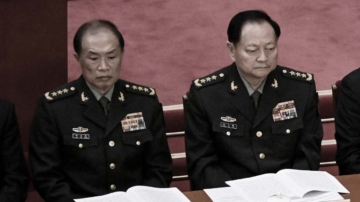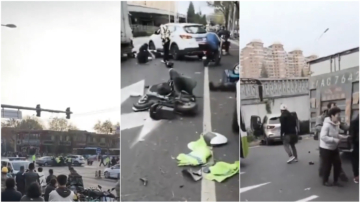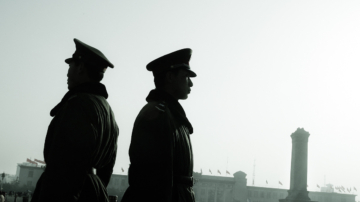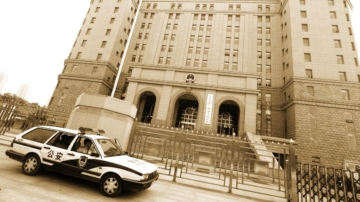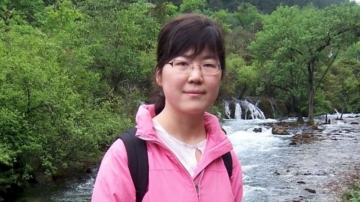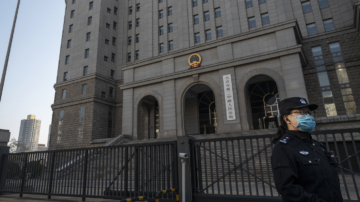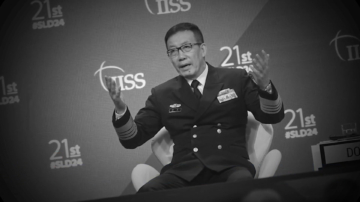【新唐人2013年04月24日讯】近来,有媒体梳理了今年中共两会期间,中共新任高官们抨击前任及谈论中共面临的危险处境。外界认为,在中共维稳成本不断增加,而维稳效果又不断削弱的情况下,中共新的领导层自然深感危机。不过专家指出,这些新贵们,想通过抱团,来维护中共的独裁统治,已经过时,那么他们应该如何自救呢?请看以下的报导。
据香港《动向》杂志披露,中共两会期间,新晋高官们除了高谈阔论外,开始敢于扮演改革卫士,毫不留情的抨击、清算前任的政策失误。
如:发改委主任张平谈“三农”问题,他说,有11年时间了,年年“中央一号文件”讲“三农”,但人人都深知“三农”是中国最薄弱的点;而贵州省委书记、人大主任赵克志谈茅台酒,他说,中央厉行节约,反对浪费的新规出台,把茅台酒列作禁令,还不如严禁各种津贴、奖金。
另外,湖北省委书记、省人大主任李鸿忠说他有六怕,一怕:百姓发动上街游行、示威、集会抗议活动;二怕:网络团剿、批判围攻;三怕:内外传媒任意发挥报导,忙于应对;四怕:党政内部向中央打报告,造成关系紧张;五怕:中央调查组、蹲点组突然到湖北;六怕:翻往事、算旧账。
新任广东省市委书记胡春华说,广东有20%的人口处于贫困线;武警前司令员吴双战说,近年群体性事件上升,给武警的压力前所未有,决策层要分析反思原因。
而中共政协委员王怀超不满政府工作报告,说领导层思想不解放、不敢求真务实。
中国法学会党组书记陈冀平谈维稳添乱;科技部部长万钢谈道德没落、信仰缺失;卫生部副部长谈百姓看病难、看病贵;中纪委书记王岐山发言指称,“八项规定”输不起,时间不会太多了。
中共总书记习近平则提醒同僚,党的工作者要有自知之明,共产党员毕竟是少数。
纽约城市大学政治学教授夏明:“我想他们一方面是想通过这种警告,让共产党执政的这些官员有一种同心协力,不要那个船翻掉。让他们有一种危机意识。加强党内的团结和执政集团内部的整合。这样避免他们自己内部造成内讧。而这种分裂内讧就会引发更多的社会矛盾和群体事件。”
“纽约城市大学”政治学教授夏明还指出,中共高层的这种互相警告,也是为他们进行镇压找到某种合理的解释。
夏明:“因为他们认为现在这些群体性事件、上访,还有各种社会运动,他们认为都可能会触及到政权的安稳,当他们把它放到一个执政地位危机存亡的高度的话,那么他们就可以下重手。”
夏明认为,目前中共当局在处理一些维权人士和异议人士时,下手狠毒,反映出中共处在一种绝望中的“困兽斗”心态。
夏明表示,中共领导人的决策层,不能从中华民族,中国长期发展的高度来考虑解决危机,他们只能从自己的权力,和利益的角度来对付这些危机,从而一味的维护中共的独裁统治。
夏明:“中国共产党作为一个群体,是没办法救自己的,中国共产党人作为个体,他们可以救自己,共产党人必须脱离共产党的教条和意识形态,寻求自救,转向为民主导向的政治家,在这种情况下,中国才有希望。”
时事评论员蓝述指出,所有这些新官谈出来的问题,归根结底就是:中共没有一个民主的制度。
时事评论员蓝述:“之所以有这些问题,是因为中共的官员它不是民选出来的,他制定出来的政策,就不能解决老百姓最基本的需要。而且恶性循环,这个官员做的坏事越多,他就越不愿意给老百姓选票。”
蓝述指出,历史给了中国人一个光荣的使命,就是最终把共产主义扔到历史的垃圾堆里去,这也是每个中国人营救自己的最好出路。
采访编辑/刘惠 后制/李智远
CCP Leaders Admit Political Mistakes And Encounter Crises
Recently, media collected Chinese Communist Party (CCP)
new leaders’ comments made at two CCP annual conferences.
The comments criticized former leaders and
analyzed crises that the CCP faces.
Outsiders said that the CCP continuously increases
maintaining “stability” costs but the results are worsening.
Under such circumstances, CCP new leaders can
deeply sense the crises.
Experts pointed out that the new elites try to unite together,
to maintain the CCP’s dictatorship, which is outdated.
How does the CCP try to save itself?
Let’s take a look.
Hong Kong’s Trend magazine reported that CCP new leaders
have been talking openly in a high profile way.
They also began to act as guards of reforms.
They mercilessly criticized former leaders’ policies
and their mistakes.
For example, Zhang Ping, director of National Development
and Reform Commission mentioned “three rural” problems:
Agriculture, rural areas and farmers.
Zhang said that 11 years has passed, the central government
No.1 document mentioned “three rural” problems every year.
However, everyone knows that “three rural” problems
are the weakest points in China.
Zhao Ke, Guizhou provincial party secretary
mentioned Maotai liquor.
Zhao said the central government issued strict new measures
on saving money, anti-waste and Maotai liquor is banned.
But in order to achieve the purpose,
why not ban different bonuses and allowances?
Li Hongzhong, Hubei provincial party secretary said
that he has six fears:
First fear: the people went on the street to
protest, parade and appeal.
Second fear: being criticized online like bombing.
Third fear: to deal with domestic and
overseas media’s irrational reports.
Forth fear: local party and government report on others to
central government, making their relationships tense.
Fifth fear: central government suddenly sends an
investigation team to Hubei.
Sixth fear: investigating someone’s past and wrong doings.
Hu Chunhua, Guangdong party secretary said that 20% of
the population were below the poverty line in Gaungdong.
Wu Shuangzhan, former commander of forced army said that
in recent years, mass protest events increased,
the forced army encountered unprecedented pressure.
So the decision-making level must review the cause.
Wang Huaichao, member of Political Consultative Committee,
were unsatisfied with the government report.
Wang said that leadership minds are neither open,
nor pragmatic.
Chen Yiping, China law society party secretary said
maintaining stability has created chaos.
Huang Gang, minister of science and technology
talked about moral standards declining, people lack faith.
Vice minister of healthcare said grass-rooted people have
Difficulty getting medical treatment and it is expensive.
Wang Qishan, secretary of Central Commission for
Discipline Inspection claimed that
they can’t afford to lose “eight rules”, time is limited.
Xi Jinping reminded his colleagues that CCP staff must be
wise, as the CCP is a minority part of the whole population.
Xia Ming, Professor of political science at City University
of New York: “I think they used this kind of warning to
push CCP officials to work together to avoid its collapse.
To make them have the sense of crisis. To strengthen
its internal unity of the CCP and ruling groups.
By doing so, they hope to avoid internal conflicts.
The internal conflicts will cause more society
contradiction and mass protests.”
Xiao Ming said that CCP top-level warned each other,
they are preparing some excuses to carry on suppression.
Xia Ming: “As they believe the current mass protests, petitions,
and different social incidents will threat its power stability.
When they stress serious crisis is at a high level,
they will implement brutal suppression by all means.”
Xia Ming believes that how the regime are
dealing with dissidents is very brutal.
It manifests that the CCP is in a desperate situation.
Xia Ming said that the CCP leadership can’t solve problems
on the view of entire nation and China’s long-term development.
They are working on a view of its own power and interests to
deal with crises, in order to maintain dictatorship.
Xia Ming: “The CCP can’t save itself.
But CCP individual members can save themselves.
CCP members must get rid of CCP dogma
and ideology, seek self-rescuing,
become politicians that can guide the nation
towards democracy. By doing so, China has hope.”
Current Affairs Commentator, Lan Shu said that
new leaders talked about problems.
But one fundamental cause is the CCP
isn’t a democratic system.
Lan Shu: “The reason why these problems exist,
is because CCP officials weren’t elected by the citizens.
So policies they made can’t solve people’s basic needs.
Then it has negative effects - the more the officials bad deeds
are accumulated, the less the people vote for them.”
Lan Shu said that history gives the Chinese people a mission,
to throw the CCP into the trash.
This is the best way each Chinese person can rescue themselves.
据香港《动向》杂志披露,中共两会期间,新晋高官们除了高谈阔论外,开始敢于扮演改革卫士,毫不留情的抨击、清算前任的政策失误。
如:发改委主任张平谈“三农”问题,他说,有11年时间了,年年“中央一号文件”讲“三农”,但人人都深知“三农”是中国最薄弱的点;而贵州省委书记、人大主任赵克志谈茅台酒,他说,中央厉行节约,反对浪费的新规出台,把茅台酒列作禁令,还不如严禁各种津贴、奖金。
另外,湖北省委书记、省人大主任李鸿忠说他有六怕,一怕:百姓发动上街游行、示威、集会抗议活动;二怕:网络团剿、批判围攻;三怕:内外传媒任意发挥报导,忙于应对;四怕:党政内部向中央打报告,造成关系紧张;五怕:中央调查组、蹲点组突然到湖北;六怕:翻往事、算旧账。
新任广东省市委书记胡春华说,广东有20%的人口处于贫困线;武警前司令员吴双战说,近年群体性事件上升,给武警的压力前所未有,决策层要分析反思原因。
而中共政协委员王怀超不满政府工作报告,说领导层思想不解放、不敢求真务实。
中国法学会党组书记陈冀平谈维稳添乱;科技部部长万钢谈道德没落、信仰缺失;卫生部副部长谈百姓看病难、看病贵;中纪委书记王岐山发言指称,“八项规定”输不起,时间不会太多了。
中共总书记习近平则提醒同僚,党的工作者要有自知之明,共产党员毕竟是少数。
纽约城市大学政治学教授夏明:“我想他们一方面是想通过这种警告,让共产党执政的这些官员有一种同心协力,不要那个船翻掉。让他们有一种危机意识。加强党内的团结和执政集团内部的整合。这样避免他们自己内部造成内讧。而这种分裂内讧就会引发更多的社会矛盾和群体事件。”
“纽约城市大学”政治学教授夏明还指出,中共高层的这种互相警告,也是为他们进行镇压找到某种合理的解释。
夏明:“因为他们认为现在这些群体性事件、上访,还有各种社会运动,他们认为都可能会触及到政权的安稳,当他们把它放到一个执政地位危机存亡的高度的话,那么他们就可以下重手。”
夏明认为,目前中共当局在处理一些维权人士和异议人士时,下手狠毒,反映出中共处在一种绝望中的“困兽斗”心态。
夏明表示,中共领导人的决策层,不能从中华民族,中国长期发展的高度来考虑解决危机,他们只能从自己的权力,和利益的角度来对付这些危机,从而一味的维护中共的独裁统治。
夏明:“中国共产党作为一个群体,是没办法救自己的,中国共产党人作为个体,他们可以救自己,共产党人必须脱离共产党的教条和意识形态,寻求自救,转向为民主导向的政治家,在这种情况下,中国才有希望。”
时事评论员蓝述指出,所有这些新官谈出来的问题,归根结底就是:中共没有一个民主的制度。
时事评论员蓝述:“之所以有这些问题,是因为中共的官员它不是民选出来的,他制定出来的政策,就不能解决老百姓最基本的需要。而且恶性循环,这个官员做的坏事越多,他就越不愿意给老百姓选票。”
蓝述指出,历史给了中国人一个光荣的使命,就是最终把共产主义扔到历史的垃圾堆里去,这也是每个中国人营救自己的最好出路。
采访编辑/刘惠 后制/李智远
CCP Leaders Admit Political Mistakes And Encounter Crises
Recently, media collected Chinese Communist Party (CCP)
new leaders’ comments made at two CCP annual conferences.
The comments criticized former leaders and
analyzed crises that the CCP faces.
Outsiders said that the CCP continuously increases
maintaining “stability” costs but the results are worsening.
Under such circumstances, CCP new leaders can
deeply sense the crises.
Experts pointed out that the new elites try to unite together,
to maintain the CCP’s dictatorship, which is outdated.
How does the CCP try to save itself?
Let’s take a look.
Hong Kong’s Trend magazine reported that CCP new leaders
have been talking openly in a high profile way.
They also began to act as guards of reforms.
They mercilessly criticized former leaders’ policies
and their mistakes.
For example, Zhang Ping, director of National Development
and Reform Commission mentioned “three rural” problems:
Agriculture, rural areas and farmers.
Zhang said that 11 years has passed, the central government
No.1 document mentioned “three rural” problems every year.
However, everyone knows that “three rural” problems
are the weakest points in China.
Zhao Ke, Guizhou provincial party secretary
mentioned Maotai liquor.
Zhao said the central government issued strict new measures
on saving money, anti-waste and Maotai liquor is banned.
But in order to achieve the purpose,
why not ban different bonuses and allowances?
Li Hongzhong, Hubei provincial party secretary said
that he has six fears:
First fear: the people went on the street to
protest, parade and appeal.
Second fear: being criticized online like bombing.
Third fear: to deal with domestic and
overseas media’s irrational reports.
Forth fear: local party and government report on others to
central government, making their relationships tense.
Fifth fear: central government suddenly sends an
investigation team to Hubei.
Sixth fear: investigating someone’s past and wrong doings.
Hu Chunhua, Guangdong party secretary said that 20% of
the population were below the poverty line in Gaungdong.
Wu Shuangzhan, former commander of forced army said that
in recent years, mass protest events increased,
the forced army encountered unprecedented pressure.
So the decision-making level must review the cause.
Wang Huaichao, member of Political Consultative Committee,
were unsatisfied with the government report.
Wang said that leadership minds are neither open,
nor pragmatic.
Chen Yiping, China law society party secretary said
maintaining stability has created chaos.
Huang Gang, minister of science and technology
talked about moral standards declining, people lack faith.
Vice minister of healthcare said grass-rooted people have
Difficulty getting medical treatment and it is expensive.
Wang Qishan, secretary of Central Commission for
Discipline Inspection claimed that
they can’t afford to lose “eight rules”, time is limited.
Xi Jinping reminded his colleagues that CCP staff must be
wise, as the CCP is a minority part of the whole population.
Xia Ming, Professor of political science at City University
of New York: “I think they used this kind of warning to
push CCP officials to work together to avoid its collapse.
To make them have the sense of crisis. To strengthen
its internal unity of the CCP and ruling groups.
By doing so, they hope to avoid internal conflicts.
The internal conflicts will cause more society
contradiction and mass protests.”
Xiao Ming said that CCP top-level warned each other,
they are preparing some excuses to carry on suppression.
Xia Ming: “As they believe the current mass protests, petitions,
and different social incidents will threat its power stability.
When they stress serious crisis is at a high level,
they will implement brutal suppression by all means.”
Xia Ming believes that how the regime are
dealing with dissidents is very brutal.
It manifests that the CCP is in a desperate situation.
Xia Ming said that the CCP leadership can’t solve problems
on the view of entire nation and China’s long-term development.
They are working on a view of its own power and interests to
deal with crises, in order to maintain dictatorship.
Xia Ming: “The CCP can’t save itself.
But CCP individual members can save themselves.
CCP members must get rid of CCP dogma
and ideology, seek self-rescuing,
become politicians that can guide the nation
towards democracy. By doing so, China has hope.”
Current Affairs Commentator, Lan Shu said that
new leaders talked about problems.
But one fundamental cause is the CCP
isn’t a democratic system.
Lan Shu: “The reason why these problems exist,
is because CCP officials weren’t elected by the citizens.
So policies they made can’t solve people’s basic needs.
Then it has negative effects - the more the officials bad deeds
are accumulated, the less the people vote for them.”
Lan Shu said that history gives the Chinese people a mission,
to throw the CCP into the trash.
This is the best way each Chinese person can rescue themselves.

